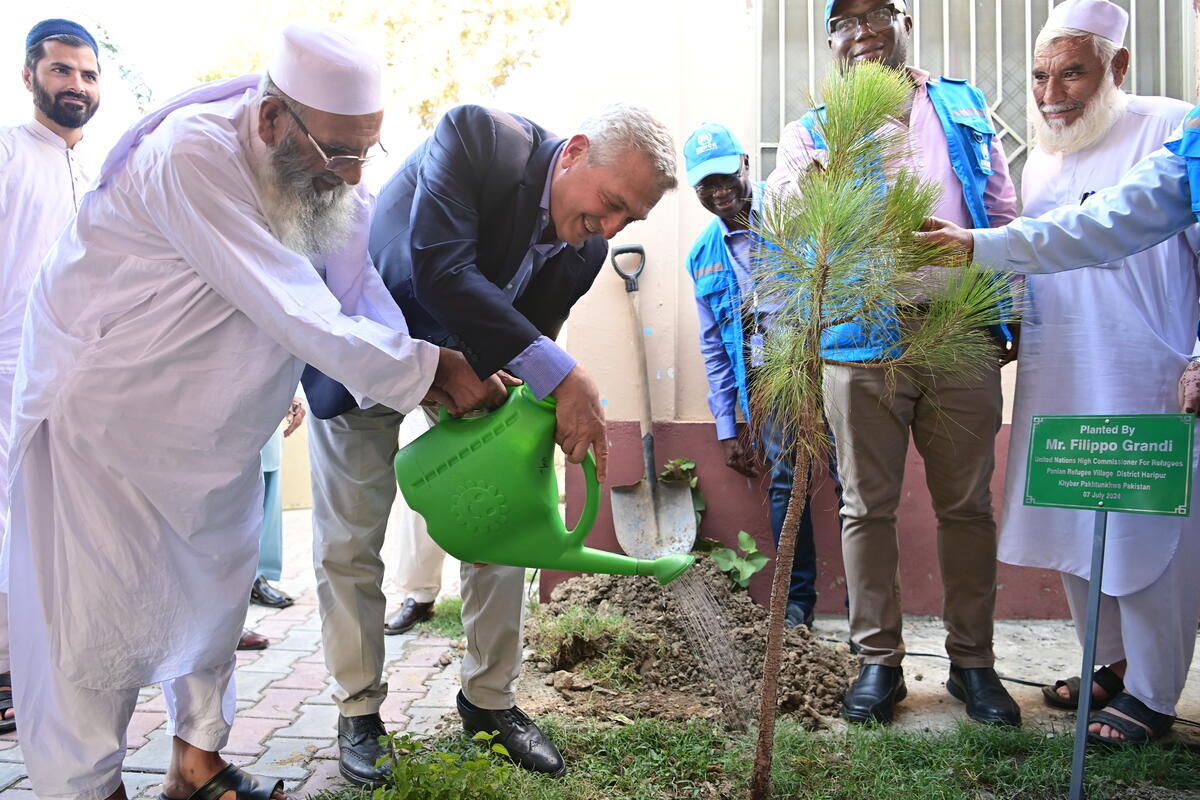Afghanistan Humanitarian Update No. 11
Afghanistan Humanitarian Update No. 11
At a Glance:
- First UNHCR emergency airlift flight into Iran set to arrive in Mashad on Tuesday.
- Thousands of Afghans blocked at Pakistan's Chaman border have left the area, retreating into Afghanistan or seeking other ways into Pakistan.
- Second UNHCR relief flight to Pakistan leaves for Peshawar.
- High Commissioner Lubbers briefs UNHCR Executive Committee
Airlifts
The first UNHCR relief flight into Iran is expected to arrive on Tuesday, 2 Oct., in Mashad, in the north-east of the country. The DC-8 will carry 40 tons of tents. The 408 tents are part of a donation of some 1,200 tents provided by the United Kingdom's Department for International Development. A second flight into Mashad is planned for the coming days with the remaining tents, as well as 350 rolls of plastic sheeting and cotton tarpaulins. One roll of plastic sheeting measures 4 metres by 60 metres and can be cut to size as needed for shelter and protection from the elements.
Meanwhile, a second airlift into Pakistan is scheduled to depart Copenhagen this afternoon, arriving in Peshawar on Tuesday morning. The flight is expected to bring in 250 rolls of plastic sheeting and 21,000 blankets. The first relief flight into Pakistan arrived in Quetta on Saturday, delivering 40 tons of plastic sheeting.
Pakistan
Between 10,000 and 20,000 Afghans estimated to be waiting at the Chaman border crossing near Quetta have reportedly left the border area. Many, particularly those from Kandahar, are believed to have retreated further into Afghanistan or back to their homes in Kandahar. Others are thought to be seeking alternative routes into Pakistan, possibly through lesser-used border crossings, or have already made it across.
Thousands of Afghans have managed to cross into Pakistan in recent days, despite the official border closure. New arrivals have reached the Quetta area of Pakistan from Kandahar, Kabul and rural areas in the south-west of Afghanistan. Some have come from as far away as Mazar i Sharif and Kunduz in northern Afghanistan. The Afghans say they decided to leave for a variety of reasons, including fear of possible military action and fear of military conscription in Afghanistan, as well as the ongoing humanitarian crisis in the country due to the civil war and serious drought.
UNHCR is ordering additional relief supplies locally in Pakistan this week. The supplies include 60,000 quilts, 20,000 plastic buckets, 20,000 kerosene stoves, 40,000 jerry cans, 20,000 kitchen sets, 40,000 synthetic mats, and 80,000 bars of soap.
Four UN agencies, including UNHCR, met on Monday in Quetta with 15 NGOs to coordinate humanitarian tasks in the region. The organizations set up six sectoral committees to handle water and sanitation, health and nutrition, distribution of relief items, logistics and infrastructure, camp management, and protection and security. UNHCR welcomes the resources and expertise of its NGO partners.
UNHCR's planning team is scheduled to visit additional potential camp sites in the Quetta area on Tuesday. UNHCR also expects to start the rehabilitation of water systems in the existing Darra and Roghani camps
Funding
In all, UNHCR has so far received more than $16 million in direct pledges from several governments in response to its appeal for $268 million to tackle a possible large-scale emergency in and around Afghanistan. The European Commission Humanitarian Aid Office (ECHO) has confirmed that it will contribute $1.8 million, and Canada has confirmed a contribution of some $800,000.
In the short term, UNHCR urgently needs $30 million to be able to handle a possible influx of the first 100,000 people.
Lubbers Briefs Executive Committee
Opening UNHCR's annual Executive Committee meeting in Geneva, High Commissioner Ruud Lubbers on Monday urged donor governments to respond positively to the $268 million appeal for the Afghanistan Emergency. The amount is to cover the needs of a possible influx of up to 1.5 million Afghans into neighbouring countries over the next six months.
Lubbers also warned of a "rising tide of xenophobia and intolerance" in the aftermath of the Sept. 11 terror attacks in the United States, noting that "Afghans are particularly vulnerable."
"Even before the barbaric acts of 11 September, Afghans constituted the largest refugee population in the world, with some 4 million spread out between Iran, Pakistan and a multitude of other countries" he said. "A war on terrorism should not become a war on Afghans. Nor should it become a war on Islam."








